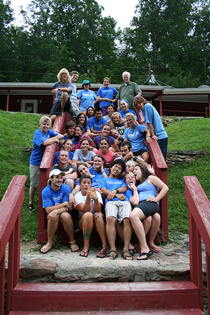
Source: Summer Camp 433, Alex, Flickr
The New York Times recently asked a group of writers and child-rearing experts to comment about the benefits of summer camps away from home, what the article called “sleep-away” camps.
This discussion was a serious interaction among adults with different opinions on the issue. In the passages below, you should be able to detect where the experts’ comments have been changed from the original. There are a few places in each of the passages where either the diction or the figures of speech have been replaced by diction or figures of speech of a much more informal tone.
This is the sort of distracting departure from a serious tone that you should be careful to revise out of your own academic writing. The first step in such a revision is to identify the diction and figures of speech in the text. In the passages below, this step has been done for you. The second step is to decide which diction and figures of speech are jarring departures from the serious tone of the text in general. This will be your challenge in the following exercise.
Below are doctored passages from the New York Times discussion with brackets around words and phrases that indicate tone and figurative language.
As you read the passage, click on the bracketed words and phrases that may disrupt the tone. Then, answer the question about whether you think the phrase needs revising. When you are finished with each passage, check your understanding to see the original version of the text.

Here is the original version of the text:
Camp also encourages kids to set their own goals and work on improving their skills in a nonjudgmental environment. Such challenges as swimming all the way out to the raft or refining their skills in a craft or leading a song before lunch give them opportunities to stretch out and succeed in new ways.
Connecting, contributing and developing confidence usually aren’t focuses of academic curricula. They can’t be taught through a textbook or measured by standardized tests. Yet they are at the very heart of what it takes to be successful in life.

Source: Vacation!, Tamara Sncy, Flickr

Here is the original version of the text:
This is why I equate summer vacations with putting change in a pocket that has a small hole in it. The longer the problem is ignored, the bigger the problem becomes.
Instead of treating June, July and August like sacred cows that can’t be sullied by academics, reconfigure the school schedule so that vacation days are evenly dispersed throughout the year.

Source: The silence of nature, Jim Nix, Flickr

Here is the original version of the text:
Mary Brown, a past member of the board of directors of the American Academy of Pediatrics, writes, “If we stress a connection to the natural environment. . . we can lessen the lifelong effects of a stressful childhood including depression, obesity, behavior problems, drug use and risk-taking behavior.” Some pediatricians are so impressed by these studies that they’re prescribing Vitamin N (for nature).
Nature is no panacea, but it offers balance. The more high-tech our lives become, the more nature we need. Nature-oriented summer camps should be available for all kids, no matter their parents’ income.
The most common problem with tone is using an informal expression in a jarringly distracting way. Revising for tone requires a good ear and the ability to hear the tone of the language you are using. You should be careful that your diction and your use of figurative language indicate the tone that you want a reader to “hear.”